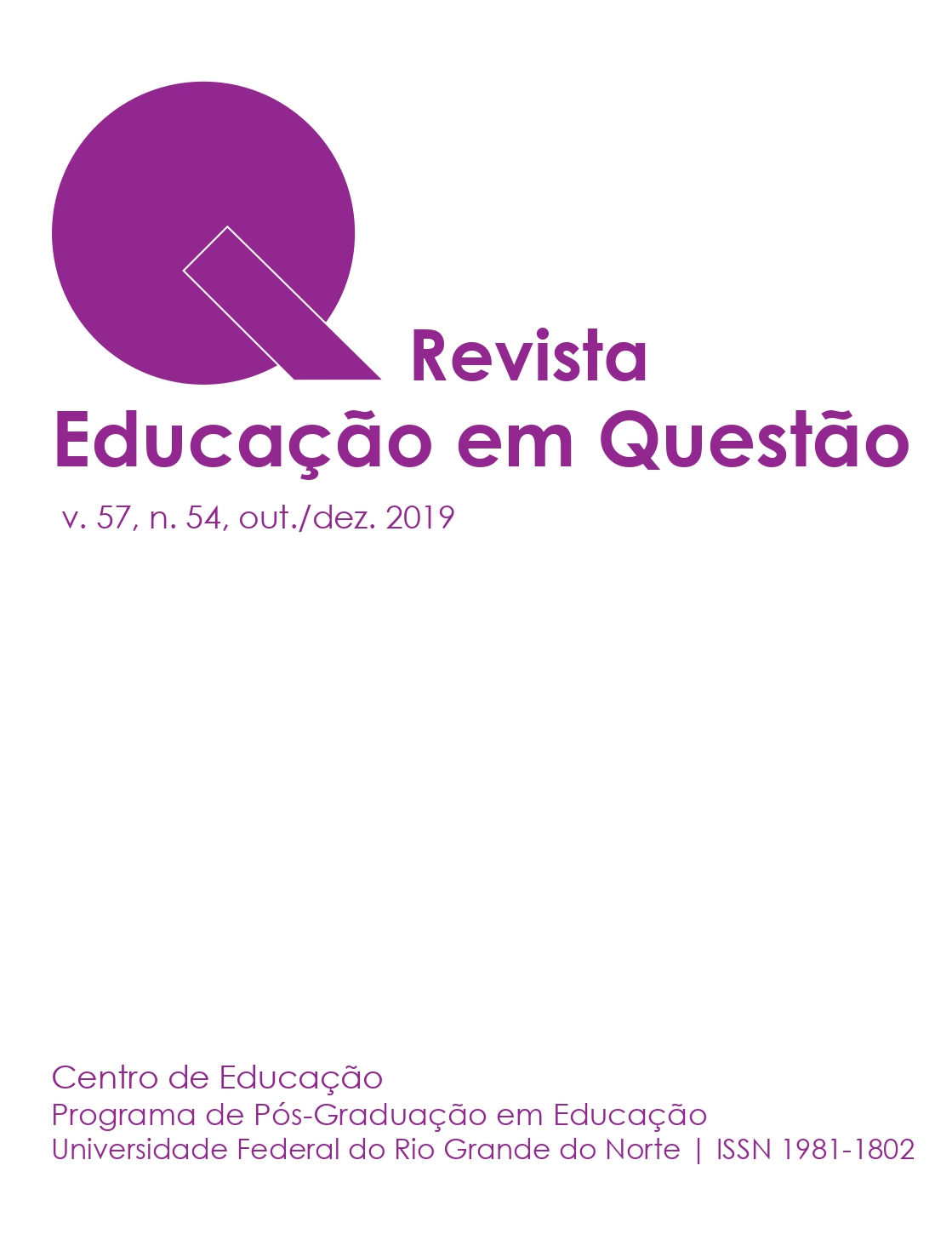Currículo e pensamento epistemológico na educação superior
DOI:
https://doi.org/10.21680/1981-1802.2019v57n54ID18569Palavras-chave:
Educação Superior. Currículo. Pensamento Epistêmico. Estudantes.Resumo
Este artigo apresenta uma análise teórica sobre as implicações das configurações do currículo, no contexto da educação superior, tendo por objetivo elaborar um conjunto de proposições curriculares para o desenvolvimento do pensamento epistêmico dos estudantes em cursos de graduação. A fundamentação teórica está particularmente baseada nos estudos de Perry (1970), Hofer (2001) e Schommer (1990). O desenvolvimento metodológico do trabalho utilizou a abordagem de investigação integrada, originalmente proposta por Cooper (1984), que possibilita elaborar um conjunto de proposições teóricas a partir de um corpus de pesquisas sobre determinado tema. O texto inicia examinando o conceito de pensamento epistemológico, no contexto da educação superior. Em seguida elabora e analisa um conjunto de proposições curriculares para o desenvolvimento do pensamento epistêmico dos estudantes. Os resultados destacam a importância do currículo englobar atividades em que os estudantes explorem conceitos sob diferentes perspectivas e desenvolvam pensamento independente, que promovam situações de aprendizagem aberta e baseada em projetos, que envolvam a construção de argumentos, bem como avaliação com respostas abertas.
Downloads
Referências
AHOLA, Salla. Measurement issues in studying personal epistemology. Psychology & Society, online, v. 2, n. 2, p. 184–191, 2009. Disponível em : http://www.psychologyandsociety.org/__assets/__original/2009/11/Ahola.pdf. Acesso em: 10 ago. 2019.
BAUMAN, Zygmunt. Intimations of postmodernity. London: Routledge, 1992.
BAXTER MAGOLDA, Marcia. Students’ epistemologies and academic experiences: implications for pedagogy. The Review of Higher Education, Las Vegas, v. 15, n. 3, p. 265-287, Spring 1992.
BRATEN, Ivar. Personal epistemology, understanding of multiple texts, and learning within internet technologies. In: KHIN, Myint (ed.). Knowing, knowledge and beliefs: epistemological studies across diverse cultures. New York: Springer, 2008. p. 351-376.
BREM, Sara. K.; RUSSELL, Janet; WEEMS, Lisa. Science on the web: student evaluations of scientific arguments. Discourse Processes, Saint Joseph, v. 32, n. 2 e 3, p. 191-213, 2001.
COOPER, Harris. Integrating research. Newbury Park: Sage, 1984.
EDMONDSON, Katherine; NOVAK, Joseph. The interplay of scientific epistemological views, learning strategies, and attitudes of college students. Journal of Research in Science Teaching, Reston, v. 30, n. 6, p. 547–559, 1993.
GLASS, Anna. The state of higher education 2014. Paris: OECD, 2014.
HOFER, B. Personal epistemology research: implications for learning and teaching. Journal of Educational Psychology Review, online, v. 13, n. 4, p. 353-383, 2001. Disponível em: https://link.springer.com/article/10.1023/A%3A1011965830686. Acesso em: 10 ago. 2019.
HOFER, Barbara. Epistemological beliefs and first-year college students: motivation and cognition in different instructional contexts. In: ANNUAL MEETING OF THE AMERICAN PSYCHOLOGICAL ASSOCIATION - APA, 102., 1994, Los Angeles. Proceedings [...] Washington: APA, 1994. p. 1-25.
HOFER, Barbara; PINTRICH, Paul (ed.). Personal epistemology: the psychology of beliefs about knowledge and knowing. Mahwah: Erlbaum, 2002.
HOFER, Barbara; PINTRICH, Paul The development of epistemological theories: beliefs about knowledge and knowing and their relation to learning. Review of Educational Research, Washington, v. 67, n. 1, p. 88–140, 1997.
KING, Patricia; KITCHENER, Karen. Reflective judgment: theory and research on the development of epistemic assumptions through adulthood. Educational Psychologist, London, v. 39, p. 5–18, 2004.
KING, Patricia; KITCHENER, Karen. The development of reflective thinking in the college years: the mixed results. New Directions for Higher Education, San Francisco, n. 84, p. 25-42, Winter 1993.
MOORE, William. Student and faculty epistemology in the college classroom. In: PRICHARD, Keith; SAWYER, Mclaran (ed.). Handbook of college teaching: theory and applications. Westport: Greenwood Press, 1994. p. 45-76.
PALMER, Betsy; MARRA, Rose. College student epistemological perspectives across knowledge domains: a proposed grounded theory. The International Journal of Higher Education Research, Amsterdam, v. 47, p. 311–335, 2004.
PEDRA, José Alberto. Currículo e conhecimento: níveis de seleção do conteúdo. Em Aberto, v. 12, n. 58, p. 30-37, abr./jun. 1993.
PERRY, William. Cognitive and ethical growth: the making of meaning. In: CHICKERING, Arthur (ed.). The modern American college. San Francisco: Jossey-Bass, 1981. p. 76-116.
PERRY, William. Forms of intellectual and ethical development in the college years: A scheme. New York: Holt, Rinehart & Winston, 1970.
PERRY, William. Patterns of development in thought and values of students in a liberal arts college: a validation of a scheme. Cambridge: Harvard University Press, 1968.
PINAR, William. What is a curriculum theory? Mahwah: Lawrence Erlbaum, 2004.
RYAN, Michael. Monitoring text comprehension: individual differences in epistemological standards. Journal of Educational Psychology, Washington, v. 76, n. 2, p. 248-258, 1984.
SCARDAMALIA, Marlene; BEREITER, Carl. Knowledge building: theory, pedagogy, and technology. In: SAWYER, K. (Ed.). Cambridge handbook of the learning sciences. New York: Cambridge University Press, 2006. p. 97-118.
SCHOMMER, Marlene. Comparisons of beliefs about the nature of knowledge and learning among postsecondary students. Research in Higher Education, Ponte Vedra Beach, v. 34, p. 355-370, 1993.
SCHOMMER, Marlene. The effects of beliefs about the nature of knowledge on comprehension. Journal of Educational Psychology, Washington, v. 82, n. 3, p. 498-504, 1990.
SCHOMMER, Marlene. Student beliefs about the nature of knowledge: what are they and how do they affect comprehension. Urbana: Center for the Study of Reading, 1989.
SCHOMMER-AIKINSA, Marlene; EASTER, Marylin. Ways of knowing and epistemological beliefs: combined effect on academic performance. Educational Psychology, London, v. 26, n. 3, p. 411–423, June 2006.
SILVA, Tomaz. Tadeu da. Documentos de identidade: uma introdução a teoria dos currículos. Belo Horizonte: Autêntica, 1999.
YOUNG, Mark. Personal epistemological beliefs and their relationship to learning. Journal for Advancement of Marketing Education, online, v. 6, p. 63-76, Summer 2005. Disponível em: http://www.mmaglobal.org/publications/JAME/JAME-Issues/JAME-2005-Vol06-Issue1/JAME-2005-Vol06-Issue1-Young-pp63-76.pdf. Acesso em: 10 ago. 2019.
Downloads
Publicado
Como Citar
Edição
Seção
Licença
À Revista Educação em Questão ficam reservados os direitos autorais no tocante a todos os artigos nela publicados.
A Revista Educação em Questão reserva-se ao direito de não publicar artigos e resenhas de mesma autoria (ou em co-autoria) em intervalos inferiores há 1 (um) ano.






